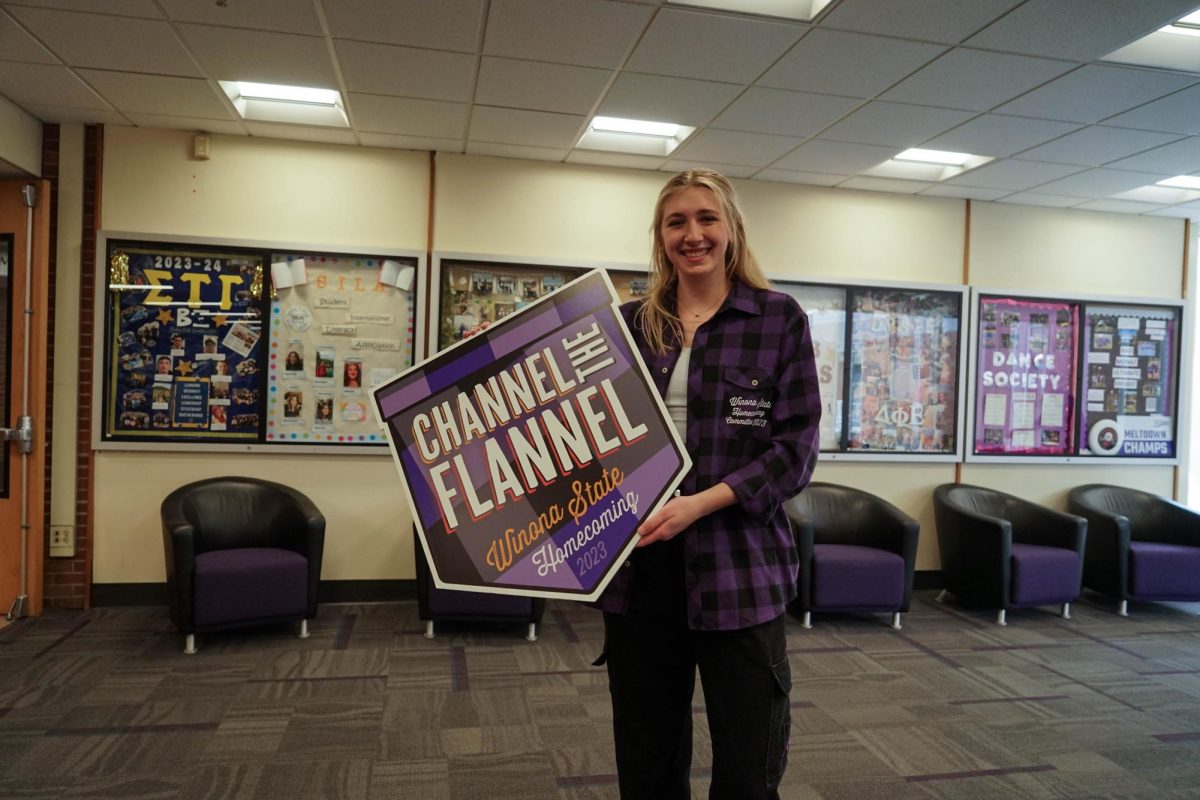Funding for project on pause after Minnesota bonding bill fails to pass
Nathaniel Nelson / Winonan
Funding for Winona State University’s Education Village is currently stalled after the Minnesota Legislature failed to pass a bonding bill.
The university hosted a community meeting on Nov. 9 to discuss the project’s development as it awaits more funding.
Education Village is a project by Winona State and the College of Education to bring all of the university’s education branches under one facility. This facility will renovate and enhance Wabasha Hall and the Cathedral School to create a vast multi-faceted campus that will allow education students to interact with K—12 students and get experience in a school environment, according to College of Education Dean Tarrell Portman.
“The goal of Education Village is to serve southeastern Minnesota and the Midwest in preparing educators to go into the school system that are prepared for 21st century learning,” Portman said.
Ron Dempsey, vice president for University Advancement at Winona State, is in charge of community outreach for projects like Education Village. According to Dempsey, the Nov. 9 meeting was one of the first community meetings located outside of campus and hopefully the first of many.
“Winona State is a big player in Winona,” Dempsey said. “When Winona State does something, it has permeations throughout the entire city. So I think if we can get ahead of that, be up front, hear what people are talking about, hear what their concerns are, I think that will be a better thing.”
The meeting was held at Watkins Manor, which is located near the future location of the village. Dempsey said the meeting was held there to allow some of the most vocal individuals, the residents of Watkins, to voice their thoughts and hear new information.
According to Dempsey, these meetings are integral to the development of Winona State. The lack of communication between the university and the public caused the spread of misinformation, Dempsey said, so these meetings were formed to provide clarifications.
“(The goal) is to answer questions and fill the vacuum of information that is created,” Dempsey said. “We want to make sure it gets filled with correct information, not hearsay.”
Part of this need to reconnect comes from the stalled construction of the Education Village project, Dempsey said, after last year’s bonding bill failed to pass.
The first phase of production was funded by a bonding bill in 2014, allotting the university $5.9 million to begin development. According to Portman, this money was put primarily into architectural design, early renovations and project planning.
The second phase, Portman said, requires an additional $25.3 million. This money will go into the rest of construction, landscaping and faculty preparation. Second phase funding will come from the state bonding bill, which covers all university project funding across Minnesota. The funding was on the table for the 2016 session, but according to Portman, a last minute change kept the bill from being passed.
“They had reached an agreement until three minutes to midnight when, in the senate, there was a motion put on the floor to add money for light rail systems in the Twin Cities,” Portman said. “That passed, which meant the bills were no longer in agreement. There was no time to get a runner from the Senate over to the House.”
According to Dempsey, the state government has been enthusiastic about the project, with bipartisan support. While the bill itself can go back and forth, the project itself has never been a problem.
“There has been no opposition to education village as a concept,” Dempsey said. “There was obviously partisan opposition to the bonding bill, largely the size and a couple of items in the bonding bill, but Education Village has not been one of those items.”
It’s not only about Winona, either. Portman said she has heard support from people all over the state, including in a chance encounter with a teacher in Bemidji, Minn. Not only that, she added, but the legislators she communicated with were equally positive.
Portman added the City of Winona has also always been a staple of the education community in Minnesota.
“The Winona community has influenced education tremendously, from being the first home of the National Education Association to having Theda Gildemeister, who wrote the first Minnesota curriculum which spread across the nation,” Portman said. “I think Winona is an ideal spot for this.”
Portman is in charge of the development of Education Village. She has been working on the project for the last few years, attempting to not only bring the department under one roof, but also to expand teaching capabilities.
The project began development in 2011, before Portman joined Winona State. Aside from a full renovation of the current buildings, Portman said the project also involves a widespread design update and new buildings to create a campus specifically for teaching and community engagement.
The new campus will contain playgrounds, schoolrooms, STEM classrooms, physical labs, architectural artwork, a coffee shop and an auditorium. Everything will be built around education, Portman said, including the landscaping itself.
“If you were a teacher in training, you could take students out and you could do a lesson on an apple tree,” Portman said. “And you would be under an apple tree.”
Portman said she hopes the bill will go back on the table in January, but since it is not a bonding year, there is no guarantee. That said, she added, she is highly optimistic about the future of the project and added that even if it does not go through this year, she will continue to push for the project’s creation.
“There’s nothing about this project that doesn’t relate to good things for children in Minnesota,” Portman said. “I have faith in the process, and I think that the legislators that I have met and talked with are really good people, and they are trying to do what’s right in their eyes for their areas and for education.”
-By Nathaniel Nelson





























































